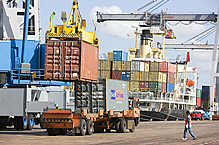
Typical street scene in Santa Ana, El Salvador. (Photo: iStock)
IMF Survey: IMF Presses Donors to Maintain Aid Flows Amid Crisis
November 28, 2008
- IMF worried financial crisis may derail progress toward MDGs
- Urges donor community to maintain aid flows
- Presses international community to reaffirm and deliver on Monterrey commitments
The IMF is urging the international community not to let the current focus on the global financial crisis result in a decline in aid to the world's most vulnerable nations or obscure attention to other urgent issues affecting low-income countries.

Along with maintaining aid flows to low-income countries, the IMF wants to see progress on the stalled Doha trade negotiations (photo: IMF)
Financing for development
Heads of state and government ministers from around the world meet in Doha, Qatar, November 29-December 2 to discuss ways of mobilizing financing for low-income countries, as well to assess progress on other key inputs for development, such as trade, aid, investment, and debt alleviation. Systemic issues, including the necessary reforms of the international financial system, will also be discussed.
The task of the conference has become more urgent and more complex because of the global financial crisis, which has caused a sharp downturn in the global economy.
The UN's Follow-up International Conference on Financing for Development was scheduled to assess progress made on the 2002 Monterrey Consensus, a landmark North-South agreement on development principles. The Doha meeting will also consider emerging challenges that have taken on a higher profile since 2002, such as climate change and food and agriculture.
The IMF is hoping that the international community will reaffirm commitments set out in Monterrey and elsewhere.
Important juncture
"The meeting takes place at an important juncture," says IMF Deputy Director Murilo Portugal, who is leading the IMF delegation to the conference. "The global slowdown triggered by the financial crisis is threatening to derail the important progress made towards the Millennium Development Goals."
The 2002 Monterrey Conference set out an internationally agreed framework for increasing the flow of private and public resources for financing development and reaching the Millennium Development Goals (MDGs). It contains a series of commitments by both developing and developed countries to strengthen the mobilization of domestic and foreign private resources and official technical and financial assistance, enhance international trade and external debt relief, and address systemic issues.
The Doha conference is an opportunity to reinvigorate the commitments of the international community at this halfway point to the MDGs. It also takes place right after the important Group of Twenty summit of November 15 in Washington that offered the prospect of a coordinated international approach to resolving the global financial crisis.
Financial crisis and response
The present financial crisis is having a major impact on advanced economies, and the effects are spreading to emerging other developing economies.
The immediate priorities identified by the IMF are to contain the financial crisis and mitigate the ensuing global recession. A continuation of coordinated measures is needed to stabilize financial markets, restart bank lending, restore confidence, and provide effective and timely assistance to emerging and low-income countries suffering from the fallout.
The rapid slump in global demand will have to be countered by fiscal expansion and further monetary easing where country circumstances allow. These efforts, too, will need to be coordinated internationally and adequate financial resources are critical. The IMF will play a central role in this coordination, and with policy advice and financing.
Second blow
Since the beginning of the financial crisis, which had its origins in the developed world, IMF Managing Director Dominique Strauss-Kahn has repeatedly urged the international community not to forget the other crises—the food and fuel crisis effecting low-income countries, as well as the spillover effects of slowing world demand on developing economies.
Many developing countries have already experienced or will experience serious setbacks through no fault of their own. Economies already weakened by the global food and fuel price crisis and still dealing with its impact now face a second blow from the global recession. Tenuous gains in poverty reduction and improvement of living standards are in jeopardy and must be protected and consolidated. [See video on YouTube: Africa Riding Out Twin Crises]
"The key message for the Doha conference is that external assistance to developing countries must not be scaled back as the budgets of advanced countries come under more strain due to the financial crisis," says Portugal.
Managing the fallout
Resources are needed to help emerging market countries manage financial contagion. Low-income countries' need for external resources is greater than ever to help them cope with volatile terms of trade and the global contraction of demand, as well as to step up progress toward the MDGs.
Further trade reform is also critical. The IMF says that the Doha Development Round must be completed promptly, both to prevent the resurgence of protectionism in response to the crisis, and to promote expanded trade that will facilitate economic and sustained global growth.
The financial crisis has demonstrated the inter-connectedness of the global economy and the need for coordinated responses to existing and new challenges. In this context, the Fund and the Government of Tanzania will co-host in March 2009 a major conference that will bring together policymakers from Africa, key external and internal stakeholders, the private sector, civil society, and private foundations, to discuss how Africa can build on its successes so far and to benefit further from integration into the global economy—effectively managing resources and dealing with exogenous shocks and a turbulent global economy.
Comments on this article should be sent to imfsurvey@imf.org


